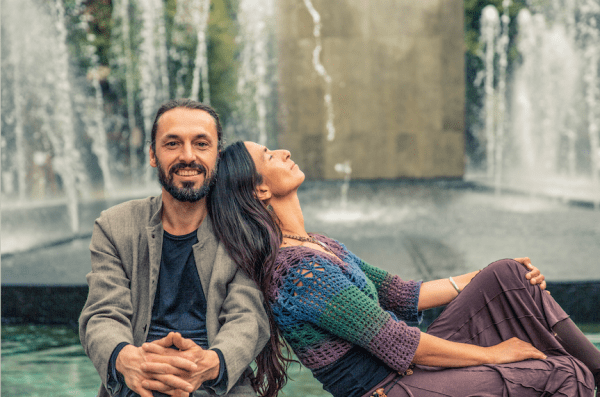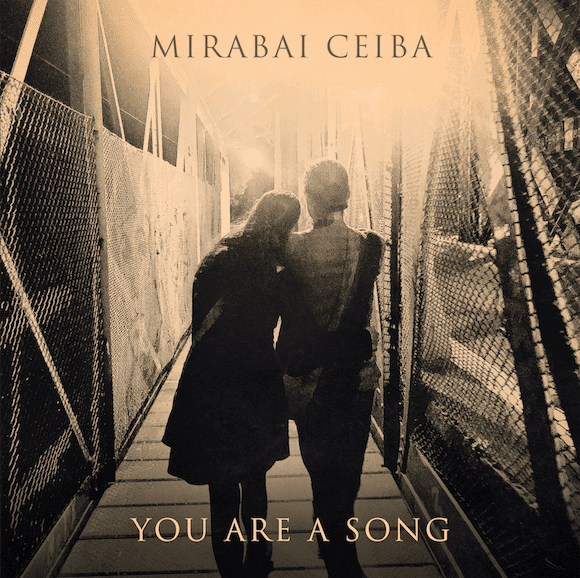
A deeply rooted sense of harmony with both nature and humanity pervades Agua de Luna, the eighth studio album from Mirabai Ceiba. Gossamer layers of gently plucked string instruments and stately piano arpeggios underscore some of the most gloriously poetic English and Spanish lyrical imagery yet to emerge
from the globally-oriented, husband-and-wife duo of Markus Sieber and Angelika Baumbach. “Agua de Luna represents a major turning point for Mirabai Ceiba,” says Sieber. “After ten wonderful years with Spirit Voyage Records, this is our first
self-released and self-produced album.
We decided to record it in the quiet atmosphere of our own home. I built a studio in a little cabin around the corner from our house in a beautiful valley near Durango, Colorado. This gave us the time and space to be really creative.” The idyllic location seeped into the music. “We really felt close to the elements, close to nature,” says Baumbach. “And we wanted to express that. For example, the element of water appears in three of the songs.”
One of these is the album’s beatific title track, “Aqua de Luna.” Awash in evocative moonlit imagery, reverence for “agua divina”—divine water—it’s a mesmerizing soundscape woven with glistening strings and a gently tidal synth
undertow. The couple’s sublimely nuanced instrumental mastery—Angelika on harp and piano, Markus on guitar, synth and the Latin American ronroco and charango—achieves new levels of empathy and expressiveness on this new
album. And they are joined by a stellar cast of players that includes keyboardist Jamshied Sharifi, violinist Bogdan Djukic, flutist Charlie Garcia and drummer Miguel Hiroshi.
Another source of inspiration for the album came from Angelika’s Mexican heritage and the couple’s travels in Latin America. “It’s a culture that always sets my heart on fire,” she says. “ So I’m very excited to open up and concentrate more on Latin America on this record—not only indigenous people, but with the purpose of connecting all people with each other. That’s what happens when we sing together. It can lead us to open our
hearts and love each other. So it’s a way to counteract all the negativity that’s around these days. Coming together to create something of beauty is a true sign of our highest humanity.”
This ideal is powerfully expressed in another key album piece, “Dejemos Al Menos Cantos.” A musical setting of a 15th century lyric by the Mexican poet and pan-Latin folk hero Nezahualcoyotl, the track incorporates a jubilant group vocal recorded at a recent Sound and Silence gathering in Costa Rica. Mirabai Ceiba hosted a giant sing-along at the event, joined by their entire audience and festival co-headliners like Tina Malia, Brenda McMorrow and Jai Jagdeesh.
Spirituality continues to play a key role in Sieber and Baumbach’s life and music. But they’ve cast their net wider on Agua de Luna. While several songs incorporate mantras from diverse traditions, others are based more in
introspective reflections and aspirations for a better world. From this emerges a recording of astounding beauty and visionary inspiration.
“In many ways, this is our most personal album,” Sieber says, “but at the same time it’s our most universal. Both those energies are present.”
About Author
You may also like
-
EMMMA SHARES THE NEW SINGLE ‘CUT THE BREAKS’
-
James Arthur Releases new single ‘Karaoke’ from Highly Anticipated Album PISCES & February 2026 UK Arena Tour Announced
-
Legacy Recordings Set to Release Willie Nelson’s Latest Studio Album, Oh What A Beautiful World, on Friday, April 25
-
RAGS AND RICHES share anthem of resilience, loyalty & unwavering spirit “Yes We Will (Mob Squad)”
-
Ethereal Ensemble VELVET MOON Unveils In The Moment Live EP & Shares Catch The Wave(Live)
